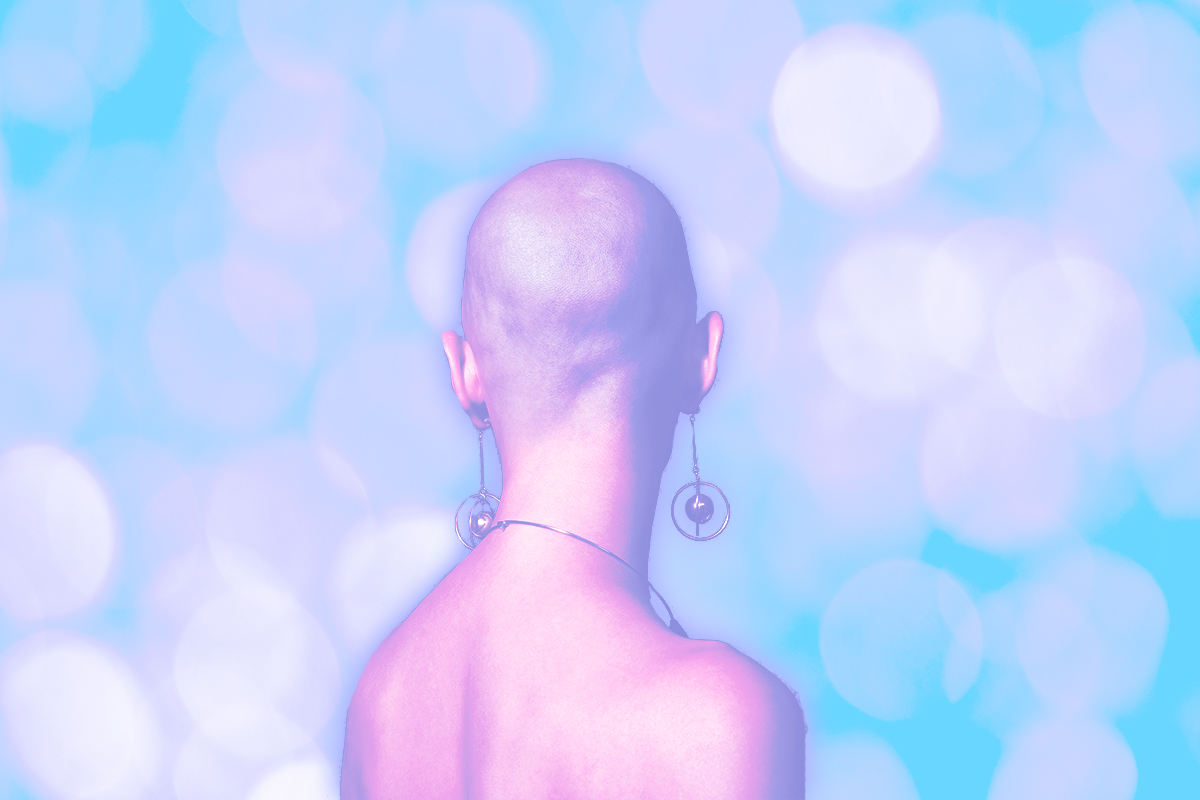There are lots of reasons why women and non-binary people decide to shave their heads. Some like the idea of not having to spend hundreds of dollars on hair care products and hours combing through tangled curls every day. Some shave their head as a way to express themselves, try out a new style, and experiment with gender identity and social norms. For others, it’s a way to honor victims of cancer.
During quarantine, shaving your head seems to be more popular than ever, with many people turning to TikTok to document their DIY cuts, though the trend is certainly not new. I spoke with six young Jews who’ve shaved their heads about why they chose to buck social conventions, and how the experience has shaped their identity.
Imagine this: You’re on a cruise ship, sailing across the equator, as tons of college students shave their head in an ancient nautical tradition. That’s exactly what roommates Gill Fertig, 19, from New York, and Lucie Jadow, 21, from Connecticut, experienced while studying abroad on Semester at Sea from January to March 2020 (the voyage ended early due to COVID).
Each semester, as the Semester at Sea ship crosses the equator, all students onboard celebrate by kissing a fish, jumping into a pool of fake fish guts, and kissing King Neptune’s ring. After bowing down to King Neptune, some voyagers partake in optional head-shaving to commemorate the day — a tradition that Semester at Sea has held decades. On the Spring 2020 voyage, at least 20 students, faculty, and family members shaved their heads. Both Gill and Lucie spent months debating whether to go bald at the upcoming head-shaving ceremony. Gill asked everyone she knew for advice and made a pro/con list to help her decide. Lucie spent hours journaling to decide whether the choice was right for her. In the emails that Gill sent to her parents and friends back home, she faced stern disapproval from worried parents and her boyfriend. Ultimately, she feels she did it out of spite, to show that it was her own decision to make.
As someone who normally relies on other people’s opinions, Gill says shaving her head “felt super freeing … I was able to show myself that I am capable of making a big decision in my life.” She admits she was worried that she wouldn’t look as good as some of the other girls with shaved heads, but soon realized that “I won’t [look like her], because I am not her, but I looked like me, and that’s okay.” As a self-described girly girl, Gill discovered that even though short hair is typically considered more masculine, she could still be her girly, feminine self with short hair.
Lucie, coming off of a time in her life when she made decisions more impulsively, said she wanted to carefully consider this decision and make sure shaving her head was what she truly wanted. However, the moment she looked in the mirror and saw her buzzed hair for the first time, she realized “it was a step in the right direction of aligning with my true self,” and that for the first time in her life, “my outsides matched my insides.”
Lucie emphasized that she didn’t shave her head because it was trendy or simply for looks, but for a more symbolic reason, writing on Instagram, “it’s a stripping away of all things superficial that we may use to hide behind or mask what lies beneath/within … it’s not exactly an unwanted exposing of the self but an awakening, an acceptance of the real, raw self that’s always been there.”
But you don’t have to participate in maritime tradition to shave your head. In fact, you don’t need any reason at all.
When Bekah Pinkham, from California, was serving in Americorps at age 19, she impulsively shaved her head in someone’s bedroom. She said it was a way to stay cool in the Puerto Rico heat, and a fresh start since her hair was damaged from being dyed many times.
For Hadar Pepperstone, 20, from New York, and Matty Powell, 20, from Wisconsin, shaving their heads was a way to raise money for pediatric cancer and honor children who had passed away. They both shaved their heads at separate events for St. Baldrick’s, an organization that raises money for pediatric cancer research. Knowing that lots of other people in their school or synagogue were also shaving their heads was comforting, and knowing that they were supporting a worthy cause helped them cope with any social pressures they may have faced. Overall, though, they said they felt very little, if any, judgement from others.
Although most of the people I interviewed did not face much judgement from others due to their haircut, they shared that many people made assumptions about them because they had short hair. Hadar said some people referred to her as “sir” when she had a shaved head, and she realized that label didn’t fit with her own sense of her identity. Shaving her head was a way to discover which identities felt comfortable, and which didn’t feel comfortable. For some women like Gill, having short hair is a way to embrace other aspects of femininity than just hair, and for others, like Lucie, it’s a way to express oneself in a less feminine way. The resounding message is that hair doesn’t define who you are.
Tauby Mintz, 22, from New Mexico, who teaches religious school at a Conservative synagogue, explained that it was “emotionally freeing” to shave her head. “Having shaved hair feels like more of a match with my identity, how I express myself and with the clothes that I wear, right now at least,” she explained. Although she loves her shaved head, she misses being able to braid and play with her hair. She explains hair’s connection to gender identity, stating that “identity is ever-changing and really fluid, but I have more peace with that now.” Tauby emphasizes that hair is a way to affirm and express identity, but it isn’t binding. Just because someone has a certain hairstyle doesn’t mean they are a certain type of person. Rather, she explains, it’s more of a broad way that people can express themselves without “having to ascribe to a certain box” and allows for change and fluidity in gender expression.
Everyone I talked to said they felt a sense of connection and a shared experience with others who have shaved their heads. Bekah described seeing a woman at the supermarket with a shaved head and feeling an instant bond because of their matching look.

For those interested in shaving their heads but feeling nervous about the big move, there are a few things you can do to make yourself feel more prepared. Hadar recommends researching ways to style short hair beforehand so that you’re prepared for every stage of growth. Plus, she likes to remind people that you can always accessorize with a wig or hat. Gill, who faced a lot of pressure when deciding to shave her head, says that being confident in why you want to shave your head is important. Matty says, “I promise your head isn’t a weird shape… that’s what everyone threatened me with. People try to scare you into keeping your hair on your head, but at the end of the day it’s not their decision, it’s yours.”
When asked if they would recommend other people shave their head, there was a resounding “DO IT!” Lucie cautioned, however, that the experience might not be for everyone. She points out that shaving your head is “just one way to achieve that kind of empowerment,” but not the only one; it’s about finding what will create the best sense of empowerment for yourself.
If you’ve read through this article without considering chopping off your hair, congratulations. But if you have even a whisper going through your mind that is making you consider grabbing the clippers one day, Tauby warns that whisper probably isn’t going away anytime soon. “If you’re thinking about shaving your head, that is not going to go away until you shave your head.”
Header image design by Emily Burack. Photo of woman by David Sacks/Getty Images, background via Jose A. Bernat Bacete/Getty Images.



